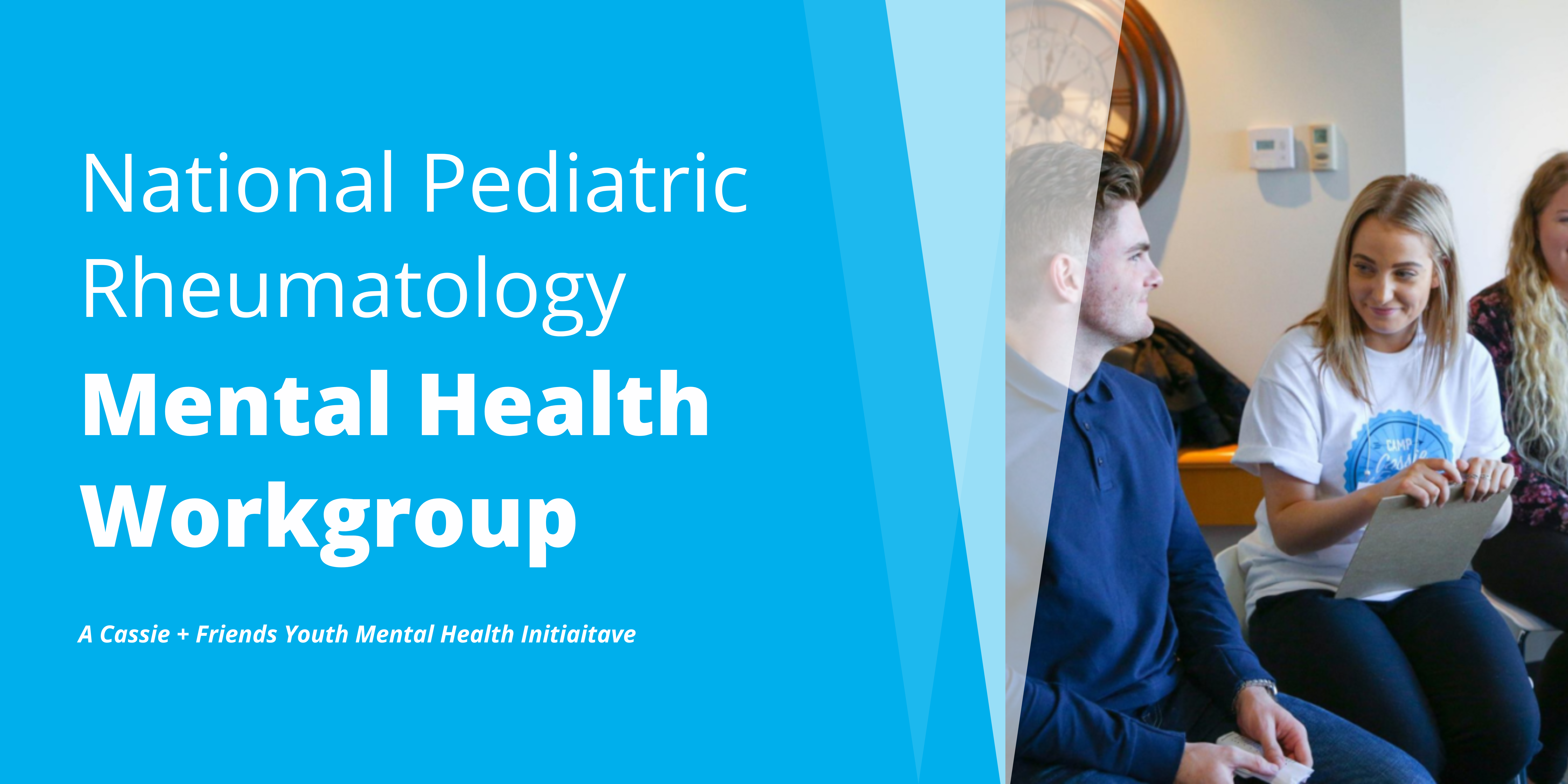mental health resources for youth
Children and teens with rheumatic conditions and chronic pain may experience feelings of sadness and anxiety, low self-esteem and poor self-image. In fact, research tells us that there are “high rates of symptoms of depression and anxiety (panic in particular) in adolescents with JIA.” The best way to address theses challenges are to be prepared for them by proactively educating ourselves and connecting with a community of support.
In this webinar, titled Anxiety and Depression in Children with Childhood Rheumatic Diseases (December 14, 2020), patient speaker, Kayla Caddy, opens up about her journey with juvenile arthritis and how it affects her mental health. Also, listen to Dr. Penny Sneddon, Psychologist at BC Children’s Hospital, as she shares what contributes to these feelings and how to improve your child’s emotional health during times of physical limitation, pain or just feeling different. You’ll also hear a number of expert tips for how you can help your child/teen see they are not defined by Juvenile Arthritis but a whole person with many different strengths and qualities.
Guided Meditations Videos
The section below contains four featured guided audio meditation videos to help you relax, focus on your thoughts and cope with pain and stress. To access the Guided Audio Meditations Playlist, click here! To access the Mental Health Animations Playlist, click here! Find a quiet, comfortable space to listen to these meditations whenever you feel overwhelmed, stressed or need to bring yourself back into the present moment.
Courtesy of AboutKidsHealth
A New Resource for Youth Navigating JA and other Childhood Rheumatic Diseases
No child should have to face JA alone. The C+F Youth Mentorship Program provides a safe and secure space where trained mentors can share their lived experiences, tips and advice for navigating growing up with JA or another rheumatic disease, and where mentees can ask questions in a judgement-free, setting with a peer that ‘just gets it’.
frequently asked questions
Below you will find frequently asked questions (FAQs) asked by parents during our latest Mental Health Webinar held on December 14th, 2020. Answers to the questions have been provided by Pediatric Psychologist, Dr. Penny Sneddon, and Pediatric Rheumatologist, Dr. Lori Tucker, both of BC Children’s Hospital.
Rates of depression tend to rise as children enter adolescence, especially among females. Rates of depression in preschoolers is approximately 1 percent, 2 percent of school-aged children, and 5 to 8 percent of adolescents
Your question really highlights how challenging it can be to parent a child with a chronic health condition who is struggling both physically and emotionally. Oftentimes, parents worry about saying the wrong thing or not doing it well enough, but what I find is that intent matters and kids/teens remember that. Being able to have conversations about the challenges, to really hear your child and to be able to sit with them during those times when they have challenging emotions or circumstances is so important and can oftentimes lead to productive conversations about what might be helpful.
Yes, there are many things that can be done to reduce anxiety about receiving needles. For some parents, this means coming up with a coping plan- things like using distraction, giving the child a sense of control by offering options (e.g., where the injection goes, look away, using numbing cream, identifying distractions to use). If you find that you need support with this, you can always talk to the team about what supports might be helpful (e.g., psychologists with expertise in this area). They can help your child learn coping strategies, come up with a gradual exposure plan (I talked briefly about this during the Mental Health Webinar above), and work with you on some parenting support strategies that can be helpful. The AnxietyCanada website has some useful strategies for supporting your child who is exhibiting anxiety.
Keep an eye out for those common presenting behaviours that often present with children/teens who are experiencing mood challenges. They include the following:
- Irritability/anger, moody
- Persistent sadness or feelings hopelessness, worthlessness or having excessive guilt
- Not enjoying things they used to enjoy
- Behavioural concerns (increase in defiance or tantrums, clingy
- Withdrawn
- Changes in energy level, appetite or sleep
- Trouble concentrating or making decisions
- Suicidal ideation/self harm
- increase in physical complaints
If you are concerned reach out to the medical team or a mental health professional and they can further assess and identify supports that might be helpful.
SRIs (serotonin-reuptake inhibitors) have been shown to offer benefit to some individuals for anxiety and depression. Medications might be something to consider for those with moderate to severe symptoms and when there is substantial functional impact from the symptoms. As for children/youth with rheumatic disease, you will need to talk with your prescribing doctor and pharmacist to determine if there are any contraindications to using an SSRI with any medications your child/teen might be taking.
There is no current research on CBD products in children or adolescents, either for general health issues or treatment of chronic arthritis or mental health issues. There are risks associated with the use of these products and therefore they are not recommended for children at this time.
This is one of those specific rheumatic diseases where more study is needed regarding the psychological impact of JDM. I am aware of a couple of studies that look at quality of life in youth with juvenile dermatomyositis that show lower quality of life than peers.
I am not aware of any research that suggests higher rates of ADHD in children with JIA.
In some rheumatic diseases, such as systemic lupus or vasculitis, involvement of the brain is well known, although does not affect all patients. Some children with periodic fever disorders may have inflammation affecting the brain as well. Many other rheumatic diseases, such as arthritis, are not known to directly affect the brain with inflammation, as the inflammation of arthritis is local to the joints.
I assume you are talking about neuropsychiatric disorder such as ADHD, Tourettes, and neurodevelopmental disorders such as autism. It is important to know that these disorders are common in the general population of children, so we do see children who may have BOTH JIA and a neurodevelopmental disorder. Research has not shown higher rates of ADHD or other neurodevelopmental disorders in children with JIA.
There is some emerging research that is looking at disregulation of the immune system as a potential underlying cause of autism. However, this is an emerging area of research and it is important for more study to be done on this before any conclusions can be drawn.
There are numerous professionals with expertise in treating selective mutism. Addressing the selective mutism might help your teen and you to feel more confident when she transitions to adult care. In addition, talk to your pediatric rheumatology team, and together you can develop a plan specific for your teen that will take into account their challenges.
Anxiety is very common amongst the general population of children and teens. We also know that some children with hyper-IgD syndrome have significant effects of this auto-inflammatory disorder on the brain during development, resulting in neuro-behavioral issues. Anxiety might be one behavior that results from the difficulty coping with daily routines that are challenging for someone with hyper-IgD syndrome.
mental health stories
Youth Mental Health Research Funding Announcement
On April 11, 2024, after a rigorous selection process, [...]
Youth Mental Health Strategy Funding Announcement
Youth Mental Health Strategy Funding Announcement [...]
Mental Health Workgroup
National Pediatric Rheumatology Mental Health Workgroup Cassie + [...]
Managing JA through Movement: How Ryan’s Gym Routine Helped Him to Build Physical (and Mental) Health and Lifted His Disease Management to the Next Level
"Working out and going to the gym helped me [...]
Get to know our Youth Ambassador of of the Year, Alejandra Van Dusen
“As a young adult with JIA I have experienced [...]
Mental Health Matters: Kaese’s Journey With JA
"Feelings and emotions are real, and should be felt [...]
when is it time to get more help?
- If symptoms of anxiety/depression are significantly interfering with your or your child/teen’s functioning at home, school, or with peers
- If after learning and implementing strategies your child/teen is still suffering
- If anxiety, depression, or behaviour concerns are interfering with medical needs
additional resources:
- Anxiety Canada
- Provincial resources:
- Wellness Together Canada: Free counselling, online courses, and self-guided programs
- Feelingsfirst.ca: Important concepts around Social and Emotional Development in the early years of childhood, for parents and caregivers.












